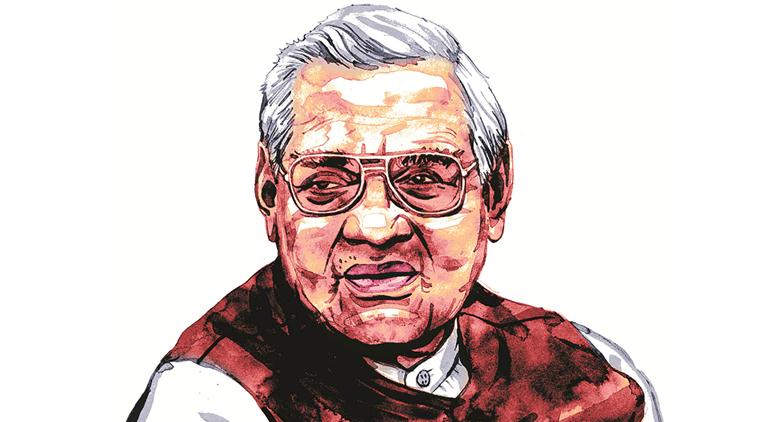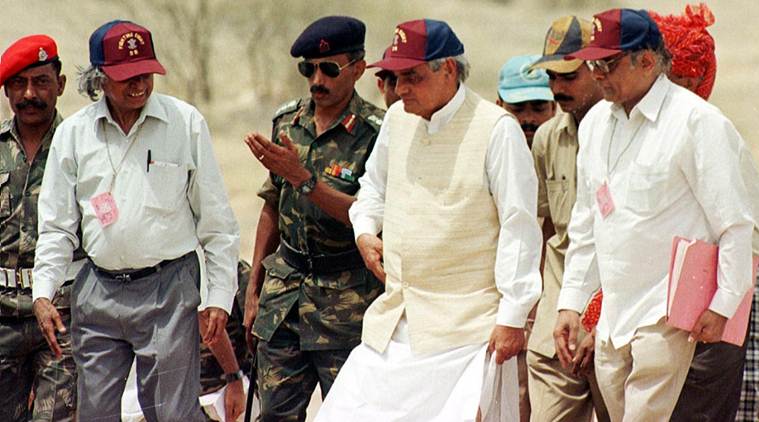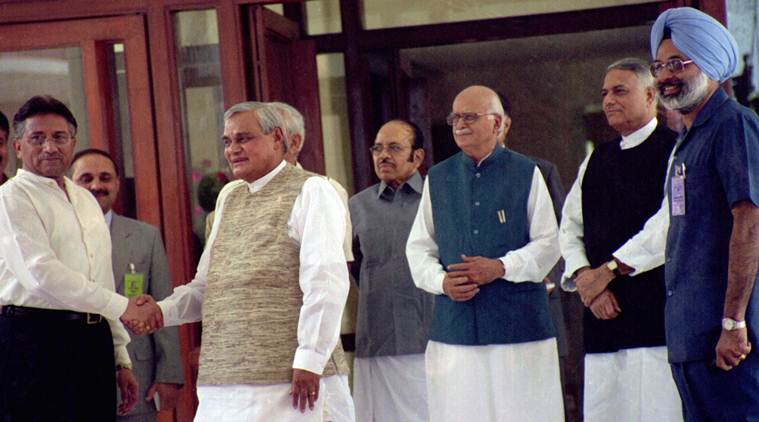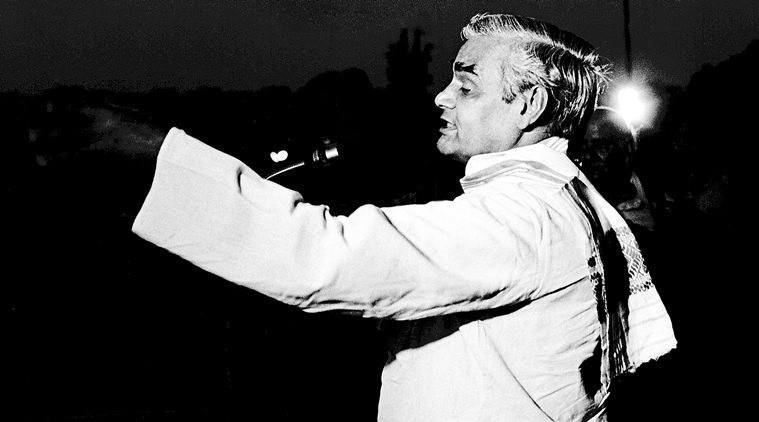 Atal Bihari Vajpayee. (Illustration: CR Sasikumar)
Atal Bihari Vajpayee. (Illustration: CR Sasikumar)
Written by A S Dulat
Plato describes an ideal ruler as a philosopher king. Atal Bihari Vajpayee was our philosopher Prime Minister. He was one of our two greatest Prime Ministers, only second to Pandit Jawaharlal Nehru. In fact, he was a great admirer of Nehruji as well. For five-and-a-half years, I worked with him. I was part of his PMO for three-and-a-half years and had the privilege of working with him very closely.
Atalji’s credentials as an outstanding politician, an orator who mesmerised his audiences and an able administrator are known to everyone. But I had the honour of knowing him as a person too. He was a gem of a human being. He understood human behavior so well that he would resolve a complex situation by a little gesture that would end bitterness and win a heart. I recollect one small incident. There had been some disagreement during a cabinet meeting. Mamata Banerjee, who was a minister in his government, had left the meeting in a huff. Soon, Atalji left for a foreign tour. On his return, several senior ministers had gone to the airport to receive him. Banerjee too was there. As she greeted him and bowed down to touch Atalji’s feet, he stopped her and instead gave her a hug. That entire controversy, the bitterness, everything evaporated with that little gesture.
From the day he became Prime Minister, a resolution for Kashmir and forging a peaceful relationship with Pakistan remained at the centre of his efforts. Today, when the situation is very bad in Kashmir, Kashmiris miss him more than anybody else. I know this too well because I have also been very closely associated with the Kashmir story all this while. Atalji’s biggest contribution was that he gave hope to Kashmiris. He understood that Kashmiris resent defeat more than anything else. And while he was Prime Minister, he ensured that his government never gave any signal suggesting a need to defeat anybody in Kashmir. He was a great leader and never allowed himself to get bogged down by an immediate crisis. He was always ahead of his time. I have no doubt that a time will come when the entire South Asia will collectively acknowledge that the Vajpayee way is the only way to move forward. I only wish Modiji had followed the Vajpayee way.
Despite many problems — and I am witness to every detail of those numerable crisis situations that he faced as Prime Minister — he never diverted from his belief that India and Pakistan have to forge peaceful relations for the larger good of our people. I don’t think there has been any Prime Minister who has faced so many crises, so many setbacks, especially in his attempts to achieve peace with Pakistan. But he never abandoned his belief because of those setbacks. When he visited Pakistan (on a bus), it was the bravest move by any Indian Prime Minister. That visit was historic and gave a lot of hope to people on either side. The visit to Lahore was remarkable. Mian (Nawaz Sharif) sahib took great care of him there. The next morning, Atalji surprised everyone when he wished to visit Minar-e-Pakistan. Of course our people were worried because of the larger political meaning of such a visit. But Pakistanis were more worried. “What will he say there? What if he says is this the Pakistan you wanted to create? Where is Bangladesh now?” they (Pakistanis) speculated. But once he visited Minar-e-Pakistan, he didn’t say any such thing. Instead, he wrote in the visitors’ book that “Strong and stable Pakistan is in India’s best interest” and wished Pakistan best of luck.
 Atal Bihari Vajpayee with Pervez Musharraf. (File Photo)
Atal Bihari Vajpayee with Pervez Musharraf. (File Photo)
That afternoon, there was a function at Governor’s house (in Lahore). There he said that his party members would say that his visit to Lahore was fine, but what was the need to go to Minar-e-Pakistan? What was the need to put a stamp (of approval) on Pakistan? But Pakistan has its own stamp. It doesn’t run with our stamp.
Whenever I spoke to him about Pakistan or Kashmir during those years, I would see that unflinching commitment to change the destiny of the entire South Asia. He had understood that there was no other way to get out of this perpetual conflict except through peace efforts. This is why he continued his efforts with Pakistan even after Kargil. Despite Kargil, he invited (President) Musharraf to Agra. In fact, when he visited Srinagar in April 2003 and addressed a massive public gathering, he spoke about it when he again offered a hand of friendship to Pakistan. He would say that he had tried two-three times already and was even let down by Pakistan, but he wouldn’t give up. Later he went to Islamabad to attend the SAARC conference as well.
 Atal Bihari Vajpayee with missile man APJ Abdul Kalam in Pokhran. India becoming a declared nuclear power in 1998, altered the region’s security paradigm, both vis-à-vis Pakistan and China. (File Photo)
Atal Bihari Vajpayee with missile man APJ Abdul Kalam in Pokhran. India becoming a declared nuclear power in 1998, altered the region’s security paradigm, both vis-à-vis Pakistan and China. (File Photo)
On Kashmir, he changed the entire narrative. He had said he wouldn’t tread the beaten path and he kept his word. Channels of communication were opened with separatists at the highest level. More importantly, he understood the psyche in Kashmir. So if you remember his speech in Srinagar that day in April 2003, he recited several verses of Mahjoor’s poem. He spoke of dialogue within the ambit of insaniyat and with one line, he opened all closed doors. He believed in opening doors, not shutting them, and it was especially important because he was doing so as the Prime Minister of India. His consistent outreach in Kashmir as Prime Minister may not have culminated in anything tangible, but he gave and sustained hope. In a way, he gave a process both in Kashmir and with Pakistan to Dr Manmohan Singh on a platter. It was the work that he had done that was subsequently taken forward by Dr Singh. And if UPA was very close to a deal with Pakistan, the foundation of the process was laid by Atalji. I always wonder what would have happened if Atalji didn’t lose the 2004 elections or if he had become Prime Minister instead of Morarji Desai earlier.
I met him for the first time in 1999 while I was chief of the Research and Analysis Wing. Later, I worked very closely with him for three and a half years while I was in his PMO. However, I had seen him for the first time in 1978 in Nepal. He was then External Affairs Minister. I was mesmerised when I heard him speak. There won’t be another Atal Bihari Vajpayee. We will not see a man like him in a hurry.
I used to regularly brief him on Kashmir and Pakistan. He would listen intently. Once I would finish, he would pause and say “das din pehlay aap ne jo bola tha, who idea theek hai, ous pe kaam kejiyay (What you had spoken about 10 days ago was a good idea. Work on that)”, he would say and turn an idea into a task. He had a lot of confidence in himself and would trust people who worked closely with him. He would remember everything and with just a little hint, he would understand the nuances of an entire programme.
He had amazing ways of resolving issues. Take the Vajpayee-Advani relationship within that government. They were best friends but there was tension too, that regular North Block-South Block tensions of those years. So whenever there was a misunderstanding, Atalji would send a word to Advaniji inviting him for a meal at his place. And if things were tense, he would send a word to Advaniji that he wants to come to have a meal at his place. Everything would be resolved over that meal. This is also how he maneuvered around 24 parties in his coalition government without any trouble.
During those years, I saw him very disturbed when there was a military coup in Pakistan. He had developed a great chemistry with Mian Nawaz Sharif and I think he had hoped that Mian sahib would be a partner in his visionary plans for South Asia. But once the coup happened, he didn’t allow himself to get stuck with his chemistry with Mian sahib. He got over it quickly and had the courage to invite Musharraf.
I will always treasure those memories. Those of us who worked closely with him were always treated like family. At home, he was called ‘baap ji’ and after a while, we all started addressing him ‘baap ji’.
 Hearing his magnificent oratory, Jawaharlal Nehru had predicted that Vajpayee would be Prime Minister one day. (Photo: Praveen Jain)
Hearing his magnificent oratory, Jawaharlal Nehru had predicted that Vajpayee would be Prime Minister one day. (Photo: Praveen Jain)
In 2004, soon after he resigned, I went to meet him to say goodbye. He was alone at home. I didn’t know what to say, so I said “what happened?” He had a great sense of humour. He said they too don’t know what had happened, referring to the Congress. We talked for a long time.
Gujarat also played on his mind always. He even spoke about it during one of his Independence Day speeches.